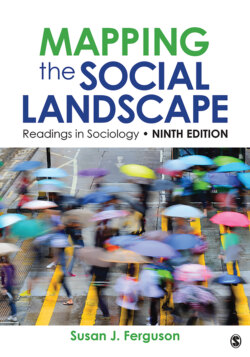Читать книгу Mapping the Social Landscape - Группа авторов - Страница 8
На сайте Литреса книга снята с продажи.
Changes to the Ninth Edition
ОглавлениеWith this ninth edition, I have selected readings that will invite students into the fascinating discipline of sociology. Most of the readings are by top scholars in the field of sociology, many of whom have high name recognition or are award-winning scholars. In fact, only 4 of the 58 readings are not authored by sociologists or other social scientists but instead are written by investigative journalists, such as Gywnne Dyer, Chrystia Freeland, and Charlie LeDuff. I also maintain a critical balance of classical (14 percent) and contemporary readings (86 percent). In this volume there are eight classic pieces that are insightful readings, and they lay the groundwork for enhanced sociological understanding. Other changes I have made include adding a new reading in the culture section on global parenting by Pei-Chia Lan and a new reading on negotiating space in gang neighborhoods by Randol Contreras. There also is a new reading in the Power and Politics section by Charles Derber and Yale R. Magrass on their timely research on employers using bullying in the workplace. I also have updated several other sections of the anthology, including the sections on the mass media, medicine and health care, and social change.
Overall, I have added several new selections to this edition of Mapping the Social Landscape to keep this collection cutting-edge with contemporary sociological research that illustrates timely analyses of social issues and the intersections between race, social class, and gender. As a whole, the readings examine critical sociological issues including gender socialization in children, the new global elites, poor women and motherhood, indigenous protests of the Dakota Oil Pipeline, black male nurses and the glass escalator, the failure of health care during Katrina, the racialization of Muslims in the United States, transgender people and gender panics, the admission policies of elite colleges, racism and health, gender and televised sports, and race, wealth, and home ownership. Among these readings are some selections that I consider to be contemporary classics in that they provide an overview of the discipline of sociology or a specific content area. These readings include the research by Matthew Desmond and Mustafa Emirbayer on racial domination, Debra Van Ausdale and Joe Feagin on preschool children’s understandings of race, Evelyn Nakano Glenn’s compelling research on skin lighteners and the racialized beauty ideal, and an essay from Dalton Conley’s collection Everywhere USA, in which he discusses the changes in the relationships between individuals and groups in society. In this edition I also have added another important work by Ruth Milkman on post-2008 millennial involvement in social movements. Based on the reviewers’ comments, I also have included eight readings that have a global emphasis, and at least seven readings in the anthology address sexuality.
In the seventh edition I brought back the piece by Kathryn Edin and Maria Kefalas from Promises I Could Keep: Why Poor Women Put Motherhood before Marriage. So many reviewers and faculty who have used this anthology wanted to see Edin and Kefalas’s research returned. Please know that every time I revise an edition, I have to cut some pieces that I think are excellent but that do not review well with other teachers or because the permission costs have become prohibitive. I know these changes can be frustrating for some of you, but I think the students will find the newer pieces in this edition to be more accessible and interesting. Of course, for all of the readings, I have tried to choose selections that are not only compelling to students but also demonstrate well the diversity within the discipline of sociology in terms of sociological theory, research methods, or area of research. I am still looking for excellent contemporary pieces that illustrate C. Wright Mills’s concept of the sociological imagination and appreciate any suggestions you may have for it or other potential readings for future editions. Please note that I welcome feedback from professors and students on this edition of Mapping the Social Landscape. You can e-mail me at Grinnell College. My e-mail address is fergusos@grinnell.edu.
